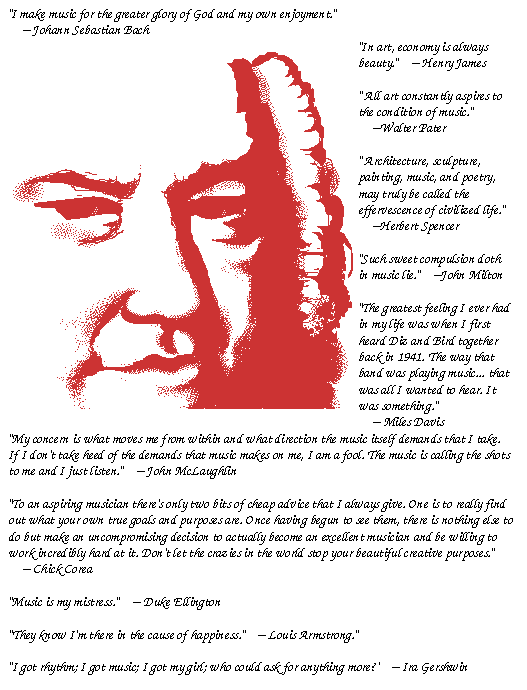|
|
The Benefits of Intensive Music Study at Home
|
|
 |
|
USSCM course materials are unique. They have been designed for eager students
like yourself, who don't have the time to sit through tedious classes; who
want to learn the essentials of the music crafts at home. A USSCM student
wants to maximize learning, while economizing on learning time.
|
|
 |
|
Self-paced
Unlike the courses offered by correspondence schools, USSCM courses are
complete in themselves and self-paced, with optional review. Your Faculty
Advisor is available on an on-call basis for motivational guidance or explanation.
|
|
 |
|
Your Reward
The returns from a USSCM education are great, the rewards, priceless:
expanded career opportunities, a diploma or Director's Diploma, additional
income from filmscores, gigs or teaching, playing music with others,
the respect of other musicians, social advantages, and hearing your music
performed. Most of all, the greatest benefit of USSCM training is a wonderful
sense of accomplishment and personal enrichment.
|
Begin at any time
|
 |
|
For your convenience, you may begin your USSCM
studies at any time, free of the scheduling issues you'll find at residential schools.
|
Pacing 1
(3 hours
per day)

VALUABLE ADVICE
|
 |
|
Your music is important to you, but you have other commitments - work, school,
friends, etc. The following is the minimum recommended schedule**
|
1 hour* |
ear training (preferably early AM, perhaps commuting) |
|
1 hour |
coursework (anytime during the day) |
|
1 hour |
instrument (before bedtime, so your unconscious can sleep on it ). |
|
Schedule 1 is the minimum recommended. A student with about three hours a
day to spend can complete a USSCM Program comfortably in eight months.
|
|
Pacing 2
(8 hours
per day)
|
 |
|
Your time is your own. You're willing to make this your job for a concentrated
period, in order to acquire rewarding lifelong skills.
| AM |
1 hour |
solfege singing; ear training (early morning) |
| |
3 hours |
coursework |
| PM |
1 hour |
keyboard (guitar) - secondary instrument |
| |
1 hour |
drums (bass) - primary instrument |
| |
1 hour |
play your axe with tapes; imagine it's a gig (before bed) |
|
Pacing 3
(12 hours
per day)
|
 |
|
You're willing to go ALL OUT! There's nothing more important to you than being a
musician. You're even willing to miss sleep when necessary. You break up your
studies into 50 minute subject sessions, and switch topics often to stay fresh
and keep your unconscious mind interested. An exception is playing along with
recordings. You can easily spend four hours at this. You have fun, but don't
waste time. You have an objective at all times. Observe schedule #2, plus:
| PM |
1 hour |
transcribing music from radio and records (real-time) |
| |
1 hour |
technique only - primary instrument |
| |
1 hour |
technique only - kbd or gtr or bass or drums (switch daily) |
| |
1 hour |
memorize and solo on tunes with metronome only |
|
Interrupting your pacing
|
 |
|
Our experience is that it takes around six to eight months of continuous
effort to become a good musician. In this time frame, the required
'critical mass' of information, ear training and technique can be built
up using innovative USSCM course materials, which will get you 'over the hump'
in music learning, instill good learning habits, and condition your musical
skills. For this reason, it is very important that your 8 month USSCM schedule
not be interrupted. However, if you must interrupt your training for some
serious reason, USSCM understands; you may resume within one year without
penalty of a tuition increase, at the same microsemester level.
|
|
|
 |
|
* Hours are 50 minutes. with a 10 minute break to move- dance, workout, etc.
** Suggested times refer to learning time, not "getting ready to learn".
|
|
|
 |
|
|
| |
 |
|

|
|

